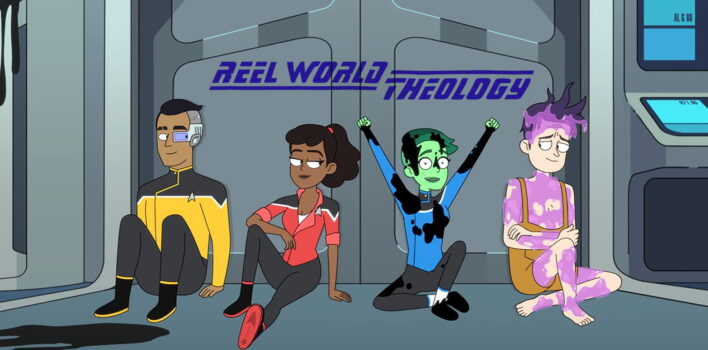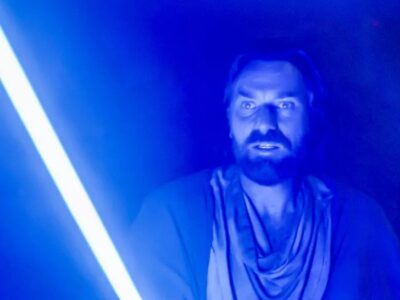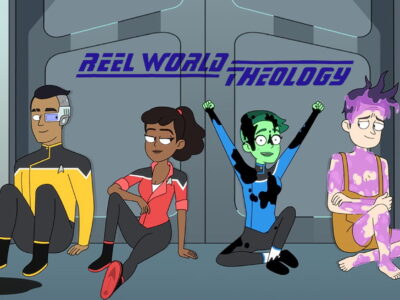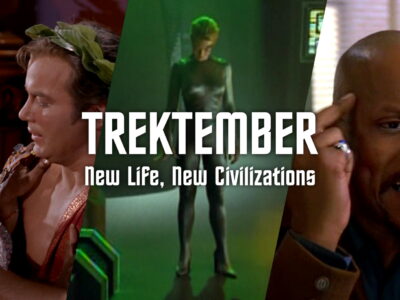“Moist Vessel” – Star Trek: Lower Decks S1E04
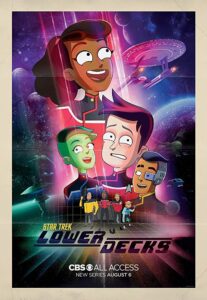 Navigating interpersonal relationships is no simple task; even if you live on a technological marvel in the distant future, it’s not the stuff in deep space that will really get on your nerves, it’s the people on that technological marvel with you. It seems that even in the far distant future, as Sartre famously bemoaned, “hell is other people.”
Navigating interpersonal relationships is no simple task; even if you live on a technological marvel in the distant future, it’s not the stuff in deep space that will really get on your nerves, it’s the people on that technological marvel with you. It seems that even in the far distant future, as Sartre famously bemoaned, “hell is other people.”
Once again, Lower Decks suffers for its brevity, but I suppose a “leave them wanting more” approach is tried and true. Nonetheless, “Moist Vessel” manages to serve up a unique but very Trek-y premise, peppering it with jokes but also a significant amount of character development (which is endangered by the inevitable reset button, but ultimately manages to stick the landing in spite of itself). The story is a lot of fun, and begins to show a level of familiarity with these characters that can only come from a production crew really reaching their stride. It’s in the same league as “Envoys” at the top of this show’s game so far, and shows some great growth in the writing staff as well as the characters.
Spoiler warning: plot and ending details for “Moist Vessel” follow.
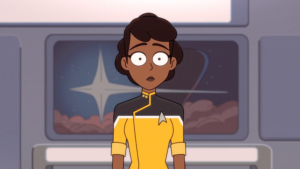 A regulation-defying Starfleet officer navigating a complicated familial relationship with a woman named Carol in an artificial cave created by an artificial terraforming process. Now where have we seen that before?
A regulation-defying Starfleet officer navigating a complicated familial relationship with a woman named Carol in an artificial cave created by an artificial terraforming process. Now where have we seen that before?
I know, I know. But one of the reasons that The Wrath of Khan succeeded where The Motion Picture didn’t is that it put the interpersonal relationships (particularly Kirk and Spock’s) in the backdrop of a fantastic science fiction premise, rather than putting the characters in the background of a space spectacle; and we see that in “Moist Vessel” as well. Interpersonal Relationships: They’re Complicated! —even in the 24th Century. For Mariner, Sartre’s other-people Hell means her mom; Captain Freeman has decided that her greatest problem is her daughter, that she isn’t what Freeman wants her to be, and embarks on a mission to conform Mariner to her will.
If there is one consistent strength in Star Trek, it’s the franchise’s commitment not only to life but to a diversity of life. Starfleet values difference, courts it, invites it in; that’s a crucial part of what the show is. But Freeman wants Mariner to be more identical to her. She’s treating Mariner as a prop in her own life; to show Captain Durango how good she is as a captain, for instance, or to vie for prime ambassadorial missions as in the previous episode. Hence, Mariner’s “hell.”
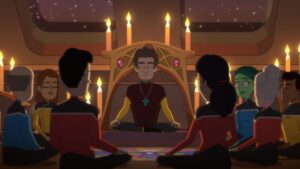 Rest assured, the real Hell is not “other people.” But the use of others to satisfy our own desires and needs is a part of the fall; it’s not what we’re supposed to be doing. Using others is an affront to how God made us to interact with one another, and a rejection of the Imago Dei—the Image of God—in each of us. But “Moist Vessel” is a strong episode because it doesn’t stop with that simple premise. Not only is life the complicating factor in Mariner’s relationship with her mom, it’s the complicating factor in the entire episode as an ancient terraforming liquid is trying to turn the Cerritos into a planet of sorts. Life gets in the way—literally.
Rest assured, the real Hell is not “other people.” But the use of others to satisfy our own desires and needs is a part of the fall; it’s not what we’re supposed to be doing. Using others is an affront to how God made us to interact with one another, and a rejection of the Imago Dei—the Image of God—in each of us. But “Moist Vessel” is a strong episode because it doesn’t stop with that simple premise. Not only is life the complicating factor in Mariner’s relationship with her mom, it’s the complicating factor in the entire episode as an ancient terraforming liquid is trying to turn the Cerritos into a planet of sorts. Life gets in the way—literally.
With the terraforming process run amok, the Cerritos crew find themselves struggling to survive in a place they once found safe. Though beautiful and priceless, when unbalanced, life becomes a danger. And that’s where we find Mariner and Freeman; their fight ends with acknowledgements of love from both of them (even though the fight quickly begins anew), and a subtle acknowledgement that each of them need the other. Without Freeman, Mariner would be out of control, and without Mariner, Freeman would be too static.
Likewise, God’s validation of our diversity comes with a clarifier: we aren’t simply to value the lives and differences of others. We have to depend on them. The vision of the Imago Dei in us is incomplete without the rest of the Body, and we have to rely on one another if we’re to accomplish anything.
The ascension coming from this is spectacular, and—God guarantees—a light burden. No giant koalas here; God gives us power and shock and skill to see through Christ who we could be as a part of the Body.
And it makes the mission a whole lot more fun, too.


